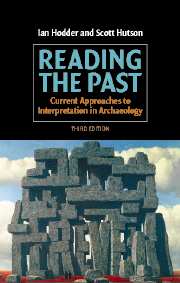Book contents
- Frontmatter
- Contents
- Preface to the first edition
- Preface to the second edition
- Preface to the third edition
- 1 The problem
- 2 Processual and systems approaches
- 3 Structuralist, post-structuralist and semiotic archaeologies
- 4 Marxism and ideology
- 5 Agency and practice
- 6 Embodied archaeology
- 7 Archaeology and history
- 8 Contextual archaeology
- 9 Post-processual archaeology
- 10 Conclusion : archaeology as archaeology
- Bibliography
- Index
1 - The problem
Published online by Cambridge University Press: 05 June 2012
- Frontmatter
- Contents
- Preface to the first edition
- Preface to the second edition
- Preface to the third edition
- 1 The problem
- 2 Processual and systems approaches
- 3 Structuralist, post-structuralist and semiotic archaeologies
- 4 Marxism and ideology
- 5 Agency and practice
- 6 Embodied archaeology
- 7 Archaeology and history
- 8 Contextual archaeology
- 9 Post-processual archaeology
- 10 Conclusion : archaeology as archaeology
- Bibliography
- Index
Summary
Many people are becoming increasingly aware that the so-called New Archaeology of the 60s and early 70s was flawed. Though the New Archaeology met resistance from its inception, a tradition of substantial epistemological critique began more than thirty years ago (Bayard 1969; Kushner 1970; Levin 1973; Morgan 1973; Tuggle et al. 1972). However there is little consensus as to the nature and scale of these flaws. It can be claimed that the New Archaeology actually inhibited the development of archaeology itself by trying to subsume it within other realms of study, such as anthropology and the natural sciences. In fact, within anthropology, the type of materialist, neo-evolutionary approach from which New Archaeologists drew inspiration had already lost much of its ground to interpretive, symbolic and structural approaches. Despite David Clarke's insistence on ‘archaeology is archaeology is archaeology’ (1968), his own approach, based on the importation of ideas from statistics, geography and the information sciences, has not led to a viable and distinctive archaeology.
Despite the great methodological contribution of the New Archaeology, many of the central concerns of the pre-New Archaeology era need to be rediscovered if an adequate archaeological discussion is to take place. Of course, the traditional approaches themselves had flaws, and these have to be dealt with. But the older approaches do not have to be thrown out totally, in the way that the New Archaeology sometimes rejected ‘normative’ archaeology (Flannery 1967; Binford 1962; 1965).
Information
- Type
- Chapter
- Information
- Reading the PastCurrent Approaches to Interpretation in Archaeology, pp. 1 - 19Publisher: Cambridge University PressPrint publication year: 2003
Accessibility standard: Unknown
Why this information is here
This section outlines the accessibility features of this content - including support for screen readers, full keyboard navigation and high-contrast display options. This may not be relevant for you.Accessibility Information
- 1
- Cited by
